Motorcycle ambulance
Motorcycle ambulances are a type of emergency vehicle which either carries a solo paramedic or first responder to a patient; or is used with a trailer or sidecar for transporting patients. Because of its size and performance, a motorcycle ambulance is able to respond to a medical emergency much faster than a car, van, or fire truck in heavy traffic,[1][2][3] which can increase survival rates for patients suffering cardiac arrest.[4][5]
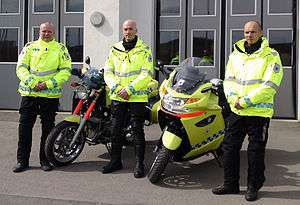
History
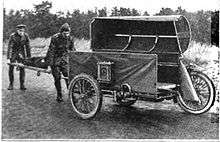

Motorcycle ambulances were used during World War I by the British, French and Americans. At the time the advantages of light weight, speed, and mobility over larger vehicles was cited as the motive for the use of sidecar rigs in this role. The US version had two stretchers arranged one on top of the other.[6][7][8] The French ambulance used a sidecar that held a single patient, who could either lie down or sit up.[9]
The British Red Cross Society used an 8 bhp (6 kW) NUT motorcycle with a double decker sidecar like the US version. During testing it needed only a 9 ft (2.7 m) turning area, versus 35 ft (11 m) for a motor car ambulance, and had a lower fuel consumption of 55–65 mpg‑US (4.3–3.6 L/100 km), compared with 12–17 mpg‑US (20–14 L/100 km) for car ambulances. Due to lighter weight they were said to be less likely to get stuck and could be pushed out more easily than a large vehicle.[10]
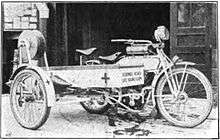
Sidecar ambulances were used in Redondo Beach, California in 1915, stationed at a bath house at a beach resort to reach drowning victims quickly. Prior to using the motorcycle, life guards had to run or row up to several miles along the beach to respond to calls.[11] The Knightsbridge Animal Hospital and Institute, London, was using a sidecar ambulance to transport dogs in 1912, and this mode was still in use in 1937 by the Maryland Humane Society.[12][13]
Worldwide motorcycle ambulances
Australia
New South Wales
In 1993 the Ambulance Service of New South Wales was the first ambulance service in Australia to introduce "Motorcycle Rapid Response Team" crewed with an Intensive care or Mobile intensive care ambulance paramedic. Two BMW K100RT motorcycles were borrowed from the New South Wales Police Force Highway Patrol with riders undertaking the police motorcycle course.[14] At present there are two motorcycle rapid response crews covering the Sydney CBD at any one time utilising Yamaha FJR1300 motorcycles.[15][16]
With Sydney's narrow streets, the Sydney Harbour Bridge, numerous parklands, and areas difficult to access in a conventional ambulance the "rapid responder" motorcycles are able to arrive on scene and begin critical treatment of patients several minutes before the arrival of a conventional ambulance whilst still carrying all the essential equipment of an ambulance.[14] It takes an average six minutes for a motorcycle rapid response paramedic to reach an emergency situation in the CBD, compared to 12 minutes for ambulances proving an invaluable resource.[17] At present there are two motorcycle rapid response crews covering the Sydney CBD at any one time.[16]
Victoria
In 2012 Ambulance Victoria introduced the 'Motorcycle Paramedic Unit' equipped with six motorcycle paramedics for rapid response to emergencies. Different types of motorcycles have been trialed including the initial roll out of Piaggio 500cc[18] which has now been replaced with the BMW F700GS.[19] The unit operates during peak traffic and during major events and festivals, within Melbourne's inner metro area.[20]
South Australia
In South Australia, there are paramedics who ride on a cycle or motorcycle; they complement the regular ambulances and are used in areas which might have less space to accommodate a bigger vehicle.[21]
Brazil

Since 2000, the São Paulo Fire Department has operated Honda motorcycle ambulances (Portuguese: Motos Operacionais de Bombeiros, known as "MOBs") in a first responder role, to offset the influence of traffic on the response times of traditional ambulances. The motorcycles carry a variety of emergency care equipment (including basic extrication, technical rescue, and firefighting gear) and are always deployed in two-man teams, with the lead vehicle carrying a first aid kit and intravenous fluids and the rear vehicle carrying more advanced equipment, including an automated external defibrillator, suction devices, and emergency delivery kits.[22][23]
Fire departments in other states, such as Minas Gerais, Mato Grosso do Sul and Pernambuco, have also adopted motorcycle ambulances since 2008.[24][25][26] In August 2008, SAMU, the federal emergency medical services, purchased 400 motorcycle ambulances to be deployed nationwide between December 2008 and 2009.[27]
Germany
The Bavarian Red Cross has operated motorcycle ambulances since 1983. As of 2011 they report a fleet of 25 motorcycles and 100 volunteer paramedics.[28]
Ghana
The Okoa Project began operating and manufacturing tricycle motorcycle ambulances in Ghana in February 2020 when they established their second international post in Tumu, Sissala East District. The Okoa Project is a nonprofit dedicated to providing critical, life saving emergency transport to maternity patients, as well as all those ill or injured in need of essential health services. In April 2020, The Okoa Project began its response to the COVID-19 pandemic, using their motorcycle ambulances to distribute hand washing stations, soap, and PPE to rural communities in the Sissala East District in Northern Ghana.
Hong Kong
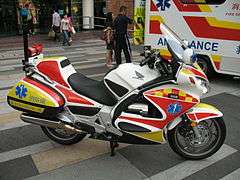
According to the book Rescue Mission which is written by an Emergency Medical Assistant of Hong Kong Fire Services Department, the H.K.F.S.D. established the first motorcycle programme in 1982.[29] At first, there are only two motorcycles stationed in Morrison Hill Ambulance Depot. In 1986, the H.K.F.S.D. found that motorcycles are useful for responding to medical calls, so they bought seven more motorcycles in 1987. In 1989, the motorcycle team had 15 motorcycles and stationed in several ambulance depots. Today, the H.K.F.S.D. has 35 motorcycles.[30]
Auxiliary Medical Service, another government-owned service, also has motorcycles.
India
Motorbike ambulance launched in Jalpaiguri, West Bengal India At 1998 by social worker Karimul Haque received the Padma Shri award in 2017.[31] Ambulances on a motorcycle platform have also been launched in multiple other states of India such as Chhattisgarh[32] , Maharashtra and Haryana[33]. These ambulances have provided emergency health services from ferrying pregnant women to a Primary Health Center to attending to First Aid in case of accidents .
Israel
Israel makes extensive use of ambucycles through both Magen David Adom and particularity United Hatzalah.
Japan
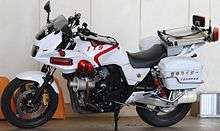
In some areas of Japan, Japanese fire departments use off-road motorcycles as emergency vehicles. They are useful for negotiating the small streets and heavy traffic in the large urban areas of Japanese cities. Having off-road motorcycles helps in responding to the mountain hills that are around a lot of cities. Some departments would likely have their crews in teams of two or three motorcycles. One of the motorcycles carries a first aid kit and/or automated external defibrillator. The other motorcycles in this team may carry fire fighting and rescue equipment. Most crews are firefighters with training in first responder, First Aid, and/or paramedic. Each crew member wears a lightweight fire suit and a fire fighting motorcycle helmet. A lot of these motorcycles have their own radio, cargo bays, lights and sirens.
Kenya
Kenya launched her first Paramedic Rider in May 2015 during the Mater Heart Run. This was done by Avenue Rescue Services Ltd, a member of the Avenue Group of Healthcare Providers. Avenue Rescue Services launched 2 motocycles manned by 4 riders. The bikes are used as first responder during the busy traffic hours and also for event coverage. The Standard chattered International Marathon was the second major event to be covered by the ParaRiders. The bikes are equipped to handle most medical and surgical emergencies.
As part of the United Kingdom's Department for International Development (DFID) wider £50 million country programme (2009), they are putting in place among other things a new motorcycle ambulance service. The Magunga's Health Centre now operates a motorcycle (sidecar) ambulance service.[34][35]
Sarah Brown, Global Patron of the White Ribbon Alliance for Safe Motherhood said:
This is yet another great example of Britain leading the way in saving mothers' lives. For a long time, the world has known what needs to be done to reduce the numbers of women dying in pregnancy and childbirth and yet the same numbers of women continue to die. The key to changing the survival chances of mothers and infants is a better investment in health services that vulnerable women can reach. DFID's aid money makes a massive difference because it means countries can invest in facilities and health workers and simple but vital things like motorbike ambulances which can often mean the difference between life or death for women who live a long way from a clinic.[36]
Malawi
They have been used in remote rural areas in Malawi[37][38] as a means to improve access to obstetric health care facilities for women in labor or needing prenatal care. Lightweight off-road motorcycles, equipped with a sidecar holding a stretcher for the patient, have been found to be an efficient supplement, but not replacement for, 4-wheel drive SUV ambulances. Purchase prices and operating costs have been found to be a fraction of a four-wheeled vehicle, and the sidecar rigs have been found to be less likely to be misused by diverting them for non-healthcare purposes. The lighter sidecar rigs are better able to cope with poor roads and areas that become impassable to heavier cars and trucks during the rainy season. Disadvantages include the reluctance of drivers to travel at night in some cases, and the inability to carry more than one patient at a time.
The report concluded that:
Motorcycle ambulances reduce the delay in referring women with obstetric complications from remote rural health centers to the district hospital, particularly under circumstances where health centers have no access to other transport or means of communication to call for an ambulance. They are also a relatively cheap and effective option for referral of patients in developing countries, particularly in rural areas with little or no public transport. Nineteen motorcycle ambulances can be bought for the price of one Toyota land cruiser car ambulance. Operating costs compare in a similar way. Motorcycle ambulances also potentially help reduce costs for women and their families to access EmOC, although this was not the subject of this study.[39]
Tanzania
The Okoa Project began manufacturing motorcycle ambulance trailers in Mbeya, Tanzania in 2018 when they launched their first international post with partner The Olive Branch for Children.[40] The Okoa Project is a nonprofit dedicated to providing critical, life saving emergency transport to maternity patients, as well as all those ill or injured in need of essential health services. They worked side by side with Mbeya communities to establish an emergency response system to dispatch the ambulances quickly.
Uganda
In the Mbale town and district in Uganda, the Partnerships Overseas Networking Trust (PONT), initiated the deployment of motorcycle ambulances in December 2010.[41]
The motorcycle ambulance work started with 5 eRanger Motorbike Ambulances. These vehicles are in use 24/7 and are providing life saving emergency transport to maternity emergencies and to the ill and injured.
32 eRanger Motorbike ambulances which, were funded in part by Rotary Clubs,[42] have now been deployed in Mbale.
A team of Welsh paramedics are saving lives six thousand miles from their Pontypridd base.
They're a key part of the PONT charity, which is supplying a fleet of motorcycle ambulances to Mbale, in Uganda. The remote, mountainous region has virtually no emergency service and desperately-ill people often have to find their own way to medical help.
But now the motorcycle ambulances – funded by the Rotary Club – and drivers trained by the PONT team are helping thousands of local people reach help.[43]
In March 2014, Pulse Village Transport in Kampala began manufacturing and distributing their product, the Village Ambulance, throughout Uganda. Their Village Ambulance is a custom-built trailer that can easily attach to virtually any motorcycle or bicycle and is designed for rough terrain and the hard to reach places. It was created to meet the medical transportation needs of rural communities and refugee settlements, with a primary focus on maternal/child health.[44] As of November 2014, they had distributed Village Ambulances to communities in over 25 districts of Uganda.
Poland
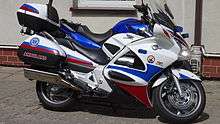
In some cities of Poland, Polish emergency units use motorcycles as emergency vehicles. They are useful as they are faster than car/truck in heavy traffic in the citycenters. The motorcycles carries usually one or two persons, a first aid kit and automated external defibrillator. The motorcycles are equipped with radio, cargo bags, lights and sirens. One of the most active non-profit organisation, using motorcycles as ambulance in capitol of Poland, is motorcycling foundation called Fundacja Jednym Śladem. Members of foundation are first responder, and all of them support Official Polish Rescue System.
Portugal
Since July 2004, the National Institute of Medical Emergencies (INEM) have included motorcycle ambulances in their services [45]. These fast ambulances are acting on the entire country.
Serbia
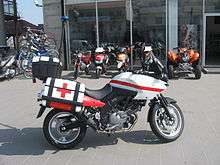
The Emergency Medical Service in Belgrade introduced a Suzuki V-Strom 650 in 2011, with the crew consisting of a motorcyclist and a doctor. Panniers and a top-box contain equipment for CPR, bandaging, anti-shock therapy, paramedic and other equipment.
South Africa
The South African National Roads Agency through ER24 EMS operates Motorcycle Medical Response Units, these units use a Suzuki V-Strom 650 staffed and equipped at an Intermediate Life Support level to respond on the E-Toll freeway and stabilize patients while ambulances make their way through traffic.[46]
Southern Sudan
In March 2009, through a partnership between UNICEF and the Government of Southern Sudan, a lifeline was extended to some pregnant women with the introduction of five motorcycle ambulances in the state of Eastern Equatoria.[47][48][49]
The UNICEF Annual Report 2009 concluded that:
The benefits for women in Southern Sudan are already apparent. No deaths were reported among the more than 170 pregnant women who used the service in 2009. Community support has contributed to the success of the initiative. The telephone number to access the service has been posted on trees, broadcast on the radio and announced in churches. People offer their phones to call the ambulances. In some cases, neighbours help carry the pregnant woman to the nearest pickup spot when a motorcycle cannot reach the woman's home. The special motorcycles are also being used to assist children and adults in need of medical attention.[50]
Since the start of the UNICEF pilot study additional motorcycle ambulances have been delivered to the region using a Not On Our Watch Awards Grant to U.S. Fund for UNICEF with the aim of Reducing Maternal Mortality Rates in Southern Sudan.[51]
United Kingdom

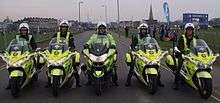
Motorcycles are used as rapid response vehicles by NHS emergency medical services and St John Ambulance in the United Kingdom.[52][53]
United States
Daytona Beach Fire Rescue in Florida has been using pairs of motorcycles since 1994 to help with response times during heavy congestion surrounding major events in the Daytona Beach area. They currently operate two Harley Davidson FLHPI Road King motorcycles.[54] Miami-Dade County, also in Florida used motorcycles for faster response times after a 2004 pilot program. They had significant success, but the program was cut in 2008 due to budget problems.[55][56] The program is credited with cutting response times in half.[56] Austin-Travis County EMS of Austin, Texas is using a fleet of four BMW G650 X-Ps to supplement the standard ambulance response. As of 2011 the motorcycles were deployed only for special events and times of unusually high traffic congestion, but the county planned to make them a regular system resource.[57][58] MSET (Motorcycle Special Events Team of Texas) is a Texas Department of State Health Services (DSHS) registered First Responder Organization (FRO), and is composed of volunteer Emergency Medical Technicians and FCC licensed Amateur Radio Operators on motorcycles. MSET is active in and outside the Austin community, supporting both mobile and stand-by events, such as bicycle races and festivals.[59]
Zambia
In 2009, a social enterprise called Zambikes designed one of the first models of the ambulance trailer called the "Zambulance." The Zambulance is a locally built ambulance trailer that can be pulled behind any bicycle or motorcycle. Zambikes' vision for the Zambulance is to connect rural African villages to critical medical treatment.[60] Since 2009, they have distributed units throughout Zambia and also exported to Malawi.
Manufacturers
Honda, BMW, and Yamaha motorcycles are common models used in many countries and departments. A number of manufacturers produce sidecars for motorcycles and scooters. Active motorcycle ambulance manufacturers include The Okoa Project, a nonprofit focused on improving rural maternal health that manufactures motorcycle ambulances in Ghana and Tanzania[61], The Ranger Production Company,[62][63] and Riders for Health, a charity which manufactures the Uhuru in Zimbabwe,[64] and Zambikes in Zambia and Pulse, a social enterprise which manufactures the Village Ambulance in Uganda.[65]
See also
- Ambulance emergency response vehicle
- Blood bike
- Fire bike
- Police motorcycle
- Cycle responder
References
- Wood, Bill (April 1984), "Responding! Chicago's Fire Department finds out that two wheels can be better than four", American Motorcyclist, American Motorcyclist Association, vol. 38 no. 4, p. 19, ISSN 0277-9358, retrieved 2009-11-03
- Sittamparam, R. (January 22, 2004), "M-cycle ambulance squad to start soon", New Straits Times-Management Times, p. 10, retrieved 2009-11-03
- Staff Reporter (27 May 2009), "Motorbike ambulance service launched in Coimbatore", The Hindu ( Chennai ), Chennai, India, retrieved 2009-11-03
- Ong ME, Chan YH, Anantharaman V. "Improved Response Times with Motorcycle Based Fast Response Paramedics in an Urban Setting" (PDF). SGH PROCEEDINGS, VOL 12, No 3, 2003. Singapore General Hospital Postgraduate Medical Institute. Archived from the original (pdf) on 9 October 2011. Retrieved 4 November 2009.
- "Report from London Ambulance Service NHS Trust". Department of Health R&D Annual Reports 2007/08. London Ambulance Service. Retrieved 4 November 2009.
- Whitney, Caspar; Britt, Albert (October 1916 – March 1917), Outing: sport, adventure, travel, fiction, 69, Outing Publishing Company, p. 490
- Hopkins, Albert (1915), "The Scientific American war book: the mechanism and technique of warfare", Scientific American: 101–102
- Windsor, H.H., ed. (1918), "Motorcycle Ambulance Has New Features", Popular Mechanics, vol. 30, p. 165
- "Chauffeur and Nurse, Too, is the Ambulance Driver", Popular Science, vol. 93 no. 2, August 1918, ISSN 0161-7370
- Buist, H. Massac (15 January 1916). "Motor Ambulances for War Service" (Adobe PDF). British Medical Journal. 2 (2804): 133. PMC 2299817. PMID 20767309.
- "Life Saving Motorcycle", Safety engineering, A. H. Best. Co., 30, p. 270, 1915
- Windsor, Henry Haven (July–December 1912), Windsor, H.H. (ed.), "Motor Ambulance for Dogs", Popular Mechanics, vol. 18 no. 1–6, p. 570
- "Sick Dogs and Cats Ride Motorcycle Ambulance", Popular Mechanics, vol. 67 no. 2, p. 201, February 1937, ISSN 0032-4558
- Paul Riley (May 5, 2013), "Ambulance Motorcycles – but where do you put the patient?", Observations of a Perpetual Motorcyclist (blog), Skill Master Motorcycle Services, archived from the original on December 3, 2013, retrieved October 15, 2013
- https://www.flickr.com/photos/nswhwpp/5529263143/sizes/o/in/set-72157626148222113/
- "City patients 'at risk' as motorbike paramedic cuts flagged". The Sydney Morning Herald.
- http://www.dailytelegraph.com.au/ambos-want-igen-to-listen-up/story-fn6b3v4f-1226135100404
- http://www.health.vic.gov.au/news/motorcycle_paramedic.htm
- Paul Riley (July 8, 2013), "Ambulance Victoria to use BMW F700GS for emergency response", Observations of a Perpetual Motorcyclist (blog), Skill Master Motorcycle Services, archived from the original on July 19, 2013, retrieved October 15, 2013
- http://www.ncah.com.au/news-events/motorcycle-paramedics-to-roll-out-in-melbourne/883/
- http://www.saambulance.com.au/Whoweare/Emergency/Singleresponders/SPRINT.aspx
- "Caos no trânsito muda trabalho dos bombeiros". G1 (in Portuguese). Globo.com. October 31, 2007. Archived from the original on September 15, 2012. Retrieved 2009-11-07.
- Azevedo, Laner (August 25, 2008). "193, o número da vida". Motonline. Archived from the original on July 3, 2009. Retrieved 2009-11-13.
- "Bombeiros adotam serviço de moto para agilizar resgate" (in Portuguese). Paraná Online. April 18, 2008. Archived from the original on March 7, 2012. Retrieved 2009-11-07.
- "Governo implantará atendimento do Corpo de Bombeiros com motos às vítimas" (in Portuguese). Notícias MS. June 30, 2009. Archived from the original on September 3, 2009. Retrieved 2009-11-07.
- "Corpo de Bombeiros implanta serviço de Moto Resgate" (in Portuguese). Governo do Estado de Pernambuco. November 10, 2008. Archived from the original on July 21, 2011. Retrieved 2009-11-07.
- Vaz, Lúcio (October 11, 2009). "Motos do Samu não estão sendo usadas para atender a população". Correio Braziliense (in Portuguese). Archived from the original on December 31, 2012. Retrieved 2009-11-07.
- Who we are, Bavarian Red Cross (BRK), retrieved 2011-12-23
- Rescue Mission. p. 173. ISBN 978-988-17-1746-7.
- Fire services factsheet (PDF), Hong Kong Government
- "Man To Get Padmashree Award For Using Bike As Ambulance". NDTV. January 26, 2017. Retrieved 2017-06-28.
- "Motorcycle-ambulances help saves lives in Chhattisgarh forests". The Indian Express. 2016-07-25. Retrieved 2017-12-19.
- "A first, CM Khattar launches motorbike ambulance services".
- "Improving Kenya's maternal care", The Guardian, London, 20 March 2009, retrieved 2009-11-03
- "Motorbikes and Midwives: Delivering Better Care for Kenya's Mums (press release)", Mobility and Health, International Forum for Rural Transport and Development (IFRTD), 8 May 2008, archived from the original on 11 November 2010, retrieved 3 November 2009
- "Motorbikes and Midwives: Delivering better care for Kenya's mums", Department for International Development (DFID), 17 March 2009, archived from the original on 7 April 2010, retrieved 4 April 2010
- "Malawi launches Road Map to prevent women from dying while giving life", Office of the UN Resident Coordinator Malawi, 30 March 2007, archived from the original on 13 November 2010, retrieved 1 November 2009
- "Motorcycle ambulances in Malawi reduce maternal mortality", Mobility and Health, International Forum for Rural Transport and Development (IFRTD), 10 Dec 2007, archived from the original on 11 November 2010, retrieved 3 November 2009
- Hofman, Jan J.; Dzimadzi, Chris; Lungu, Kingsley; Ratsma, Esther Y.; Hussein, Julia (2008), "Motorcycle ambulances for referral of obstetric emergencies in rural Malawi: Do they reduce delay and what do they cost?" (pdf), International Journal of Gynecology & Obstetrics, International Federation of Gynecology and Obstetrics, 102 (2): 191–197, doi:10.1016/j.ijgo.2008.04.001
- https://www.theokoaproject.com/timeline
- Newton, Julian. "Ambulance Overview". pont-mbale.org.uk. PONT. Retrieved 13 October 2014.
- Kenneth, Deller; Adrian, Faiers. "eRanger Motorbike Ambulances: To provide emergency transport of pregnant women and very sick children to a health facility". Rotary. Retrieved 13 October 2014.
To provide emergency transport of pregnant women and very sick children to a health facility.
- "Catch up: Wales this Week, Wheels Of Life – From The Valleys to Uganda". ITV. ITV. 7 October 2014. Retrieved 13 October 2014.
- "Archived copy". Archived from the original on 2014-10-29. Retrieved 2014-11-01.CS1 maint: archived copy as title (link)
- https://www.inem.pt/2017/05/29/motociclo-de-emergencia-medica/
- ER24 and SANRAL on the roads, ER24 Emergency Medical Services, November 28, 2012, archived from the original on September 13, 2013, retrieved April 22, 2014
- IRIN (1 April 2009), SUDAN: Biking for safer childbirth; A motorbike ambulance is test driven in South Sudan at the launch of a pilot project aimed to cut maternal mortality, Integrated Regional Information Networks (UN Office for the Coordination of Humanitarian Affairs)
- UNICEF (July 2009), Motorbike ambulances help cut maternal mortality in Southern Sudan, UNICEF
- Ngor Arol Garang (September 19, 2010), UN donates alternative ambulances to Central Equatoria State, Sudan Tribune
- "SOUTHERN SUDAN: FIGHTING MATERNAL MORTALITY, ONE MOTORCYCLE AT A TIME" (pdf), UNICEF Annual report 2009, UNICEF: 33, 2009
- UNICEF (April 20, 2010), Not On Our Watch Awards Grant to U.S. Fund for UNICEF to Reduce Maternal Mortality Rates in Southern Sudan (PDF), UNICEF, archived from the original (pdf) on March 13, 2012, retrieved October 27, 2010
- "Motorcycle responder". London Ambulance Service. Retrieved 1 November 2009.
- "Motorcycle Paramedics". Inside Out. BBC. February 2008. Retrieved 1 November 2009.
- http://www.codb.us/index.aspx?nid=456
- Paul Peluso (August 28, 2006), Miami-Dade Fire Rescue Introduces Motorcycle Medic Team, EMSResponder.Com News
- Bart Madson (January 10, 2007), Miami-Dade's Motorcycle Medics, Motorcycle USA
- Jessica Mulholland (November 28, 2011), "Motorcycle Medics Reach the Injured Faster in Austin", Government Technology
- Erin Cargile (July 13, 2011), Paramedic motorcycles hit the streets: High-powered way to zip through traffic, KXAN news
- "Motorcycle Special Events Team of Texas". MSET. Retrieved 28 February 2020.
- http://zambikes.org/why_zambulance/
- https://www.theokoaproject.com/our-vision
- "Archived copy". Archived from the original on 2010-08-20. Retrieved 2009-11-01.CS1 maint: archived copy as title (link)
- http://www.southafrica.info/business/trends/innovations/eranger.htm
- George, Rose (6 December 2004). "Two wheels good". London: The Independent. Retrieved 4 November 2009.
- Didas Kisembo (September 20, 2014), "Impact Journalism Day: The village ambulance: How its advent is changing rural Uganda", The Monitor, Uganda, archived from the original on October 28, 2014, retrieved October 28, 2014 – via Asahi Shimbun
External links
| Wikimedia Commons has media related to Ambulance motorcycles. |